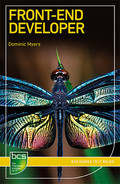6 CONCLUSION
It has never been so easy to learn front-end development. The number of resources available to you is almost overwhelming, and this is where you should be cautious, as it is easy to get distracted by older, stale resources which are not relevant to more modern development. Keeping the trinity of HTML, CSS and JavaScript in mind and reading around the subject should stand you in good stead.
Those coming to the front-end from other realms of development are sometimes appalled at the fast-and-loose nature of JavaScript. However, their desire to program in a stricter and statically typed language may be assuaged by using TypeScript or some other language that is transpilable to JavaScript. Indeed, the list of languages that compile to JavaScript (Ashkenas, 2018) suggests that no matter what style of programming you are comfortable with, you will probably find a method of converting it to JavaScript, if not now, then soon.
Being conversant in HTML, CSS and JavaScript, perhaps with a specialisation in either CSS or JavaScript, will mean that your job prospects are likely to remain excellent for the foreseeable future. Being conversant with both CSS and JavaScript might even make your HTML much more flexible; the current interest in native web components means that we are now more or less able to create or extend HTML elements in a way we once thought impossible. With a native web component, we can extend existing, or create new, HTML elements without having to include external libraries. Native web components are fascinating and represent a further union of HTML, CSS and JavaScript.
I thank you for your patience in reading this book. Front-end development is a relatively new field and one which is already becoming fragmented by its specialisations, but I hope I have offered something of a general introduction to the basics. Recently I have seen these basics discussed under the banner of ‘web fundamentals’, which, I guess, illustrates that this is merely a starting point and an indication that there is so very much more to learn.
Embrace that opportunity for learning and don’t feel intimidated by it. I appreciate that it can sometimes feel overwhelming, but I, for one, find that the more I learn, the more comfortable I am learning. I would not go quite so far as Ed Hess (2014) when he says, ‘Learn or Die’. However, if I ever felt like I had learnt everything there was to learn about a subject, I think it would be time to move on and learn something new. Experts I have known in other fields certainly echo this idea. In the realm of front-end development at least, there will always be something new to learn.
